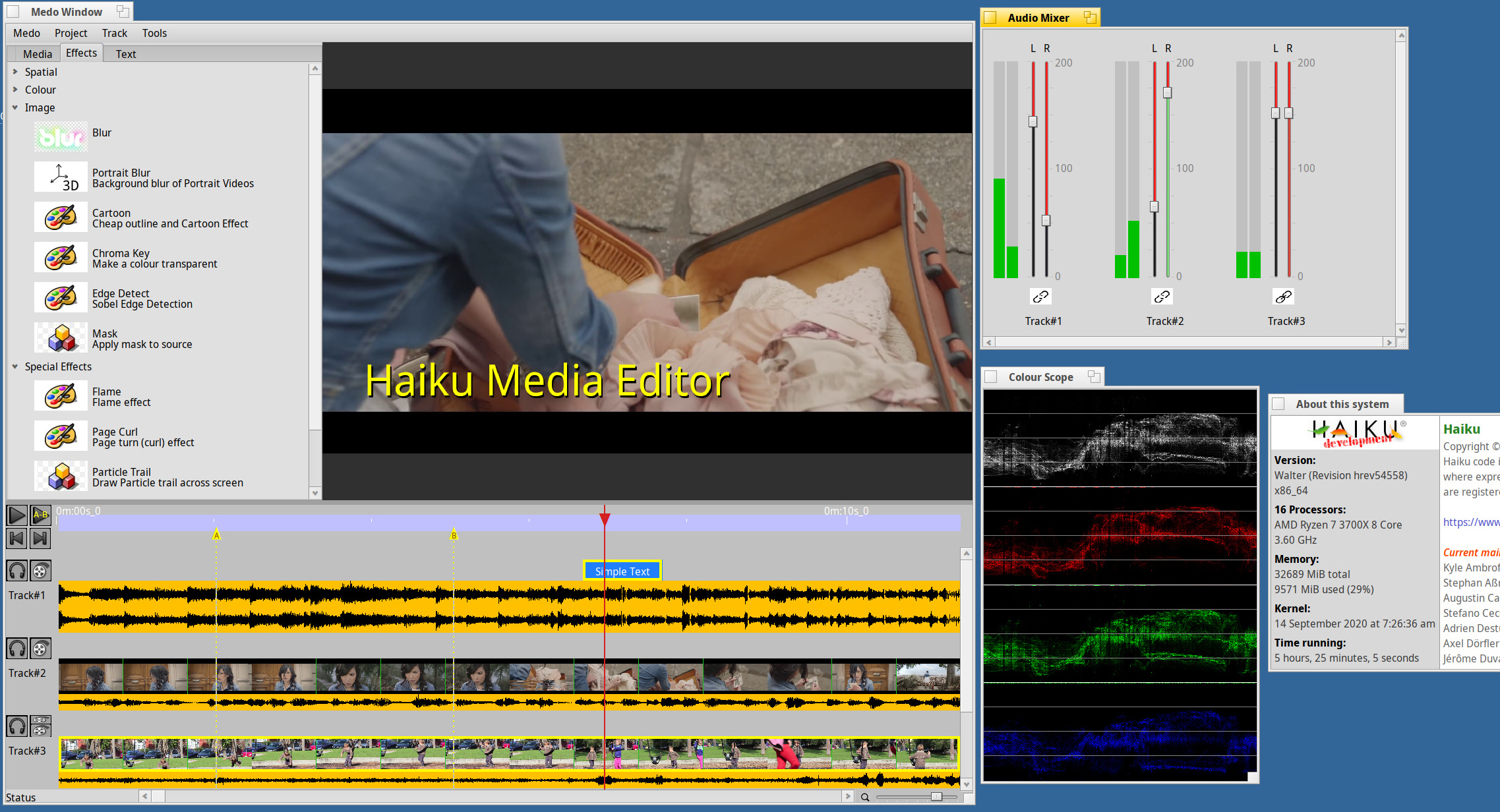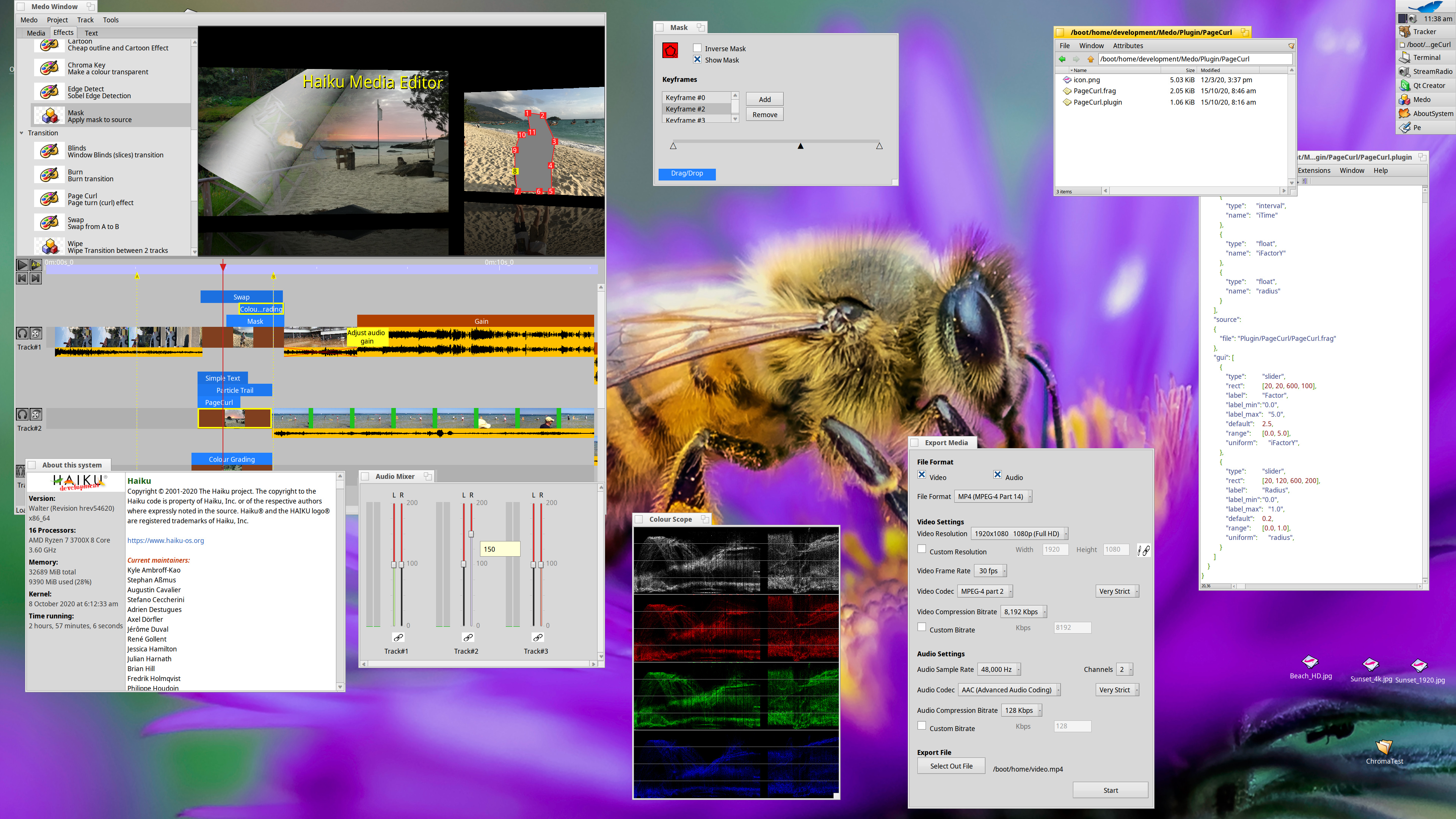Looks good! More clean interface than Kdenlive!
First Particles test (I’ve combined it with teletype effect):
Lots of configurable items, however there is still a lot of work needed for the motion path GUI. First release will have a simple path.
A couple of hours per week, and I got an Audio mixer working with the expected features (left/right channel gain, plus visualizations) and saving/muting each channel. All up it’s probably 16 hours of work (2 days if working full time), but at hobby Open Source timelines that’s 1 month of getting up at 5 in the morning to do some work. So Open Source projects will always lag commercial efforts by a factor of 10.
All Open Source projects would really benefit from setting up a development financial pool, where users chip in for targeted projects / features. This is a workable economic model which can make Open Source projects thrive and be competitive against commerical apps.

Well you can set up an account at Librapay, Bountysource, or Patreon, and start accepting donations. However, maybe it would help to first share a version of your work (beta versions for Patrons on patreon?). Some developers already have liberapay accounts at least (with not much money going to them, yet: https://fr.liberapay.com/Haiku/income/)
You can also contact Haiku inc if you think they should participate to funding your work (I don’t know if they will, I’m not part of the inc)
At BeOs days there was the Guru Tech award for the best BeOs Programs…
Why not spent the collected money to honour the best developer or Haiku fan per month?
So… Liberapay… I had never heard of it. So, I went to the page. It was in French but Google offered to translate and it translated pretty good. I was setting up a monthly donation. I filled out the first page. When it went to the payment information page. It was again all in French with no way to translate. So… even though I would make a monthly donation, there doesn’t appear to be a way for me to do it. Unless I learn French. I’m not going to sit here and input my Credit Card into a site that I can’t read. So… just how useful is it to Haiku to limit donation to only people who speak French?
One day these people will wake up to the fact that we live in a horizontal world, and will make the enormous effort to turn their phones through 90 degrees.
There is also this Donation link from the main Haiku page: Haiku Donation But it only appears to accept a one time donation and I’m not sure that this one give money directly to devs on a regular basis. I would prefer to be able to setup a monthly donation like on the liberapay that is distributed to the devs working on Haiku. But the site would need to be able to work in English, at least for me. Are there no ways to do this? Does Pateron support more than one Language?
Really, this is the link he provided.
https://fr.liberapay.com/Haiku/income/
How am I supposed to know that it is in English? Where are the devs advertising it’s very existence?
That said. I will setup a monthly donation.
You can change the language in the link  https://en.liberapay.com/Haiku/income/
https://en.liberapay.com/Haiku/income/
@Begasus To be honest, it’s not easy for everyone to figure out and the language menu should appear on all site pages.
@DFergFLA Normal donation to Haiku goes by Haiku Inc. The Inc will then pay for infrastructure, boots on events, hire a dev for a specific task etc. Without that, there’s no forum for example.
A donation via liberapay on the other hand is a direct personal donation to people that are also Haiku or Haiku community devs. They may use this way to get retribution for other things than Haiku. This said, it happens that people are glad when a bug that was annoying for them is finally solved and they want to give something directly. But devs don’t want to enter a game where people would turn it the other way and pay to get something fixed. So it isn’t hidden but not advertised partly because not directly linked to Haiku.
A quick search on google revealed some info for this ![]() Only took me about 2 seconds
Only took me about 2 seconds ![]()
@Starcrasher Ok, makes since. OTH, I have setup my monthly donation for the devs. They may even be able to buy a 1/4 gallon/liter of gas/petrol with it… maybe…  Anything to help the devs keep going. Even if it just buys them some extra caffeine.
Anything to help the devs keep going. Even if it just buys them some extra caffeine.
One year MEDO Video Editor happy Birthday…
Keep up your great work !
Anyway there’s an official place (aka github workspace) to spread ?
Some other (maybe inspiring) suggestions:
- OFX support;
- VST (chaining too) support for audio tracks/buses would be great (can Juce help ?);
- Professional color/aspect/noise correction (may RawTherapee inspire ?);
- Ability to copy and trim - losslessly - source a/v files during save/export project (like LosslessCut ?);
- Ability to create (ad use) proxy files.
Last but not least, it would be great - and may help to speedup the project evolution - to establish some kind of collaboration with other NLE projects.
Hope that helps.
Thanks for the suggestions. At this point in time, I have one primary feature left (sound record via mic-in), and tons of bug fixes to do after that. I’ll also go through the motion of editing a fully featured sequence, to identify any pain points when dealing with a proper project. I was planning to open source it once it is in a respectable state, since you only get to make a first impression once, and I want to create a decent first release. Its harder to get contributors when the project is in a rough state.
Regarding your suggestions:
- initial release has 2 types of plugins, a) dynamic text via a json file + GLSL shader (think Shader Toy), and b) a binary add-on for 3rd party plugins. I guess an OFX importer might be possible if the demand is there later on, same with VST.
- for colour grading, it supports Adobe LUT, colour curves, white balance and the standard set of grading tools. More can come later.
- all alterations are “lossless” since effects are layered, so you can easily toggle which layers are active. The GUI is respectably fluid.
- projects can be at a smaller resolution and exports at higher resolution, it helps when you dont have HW acceleration. Basic HD editing is fine on 4 core system, it only slows down if you have heavy GLSL effects (blurs, particles, masks).
I expect to start preparing for initial release in 6-8 weeks, so maybe if all goes well I can time a release for Christmas.
Thx again for the kind words of encouragement.
I guess there is nothing wrong with the following development shortcut:
The menu item will spawn the built in application SoundRecorder, and I rely on the user to save the recording somewhere and import that into the project. Not as clumsy as it sounds, and this moves the project closer to release. Later on we can worry about inter application messaging to skip the save/import steps. Moving on …
New screenshot. I think I’m feature complete, now just ironing out the major bugs, adding polish, pixel alignments, things like that (ie. the other 90% work). One major obstacle that I must fix before release is getting everything working with mixed resolution sources. I’ll planning initial open source release before the end of the year …

great … 


thanks @Zenja